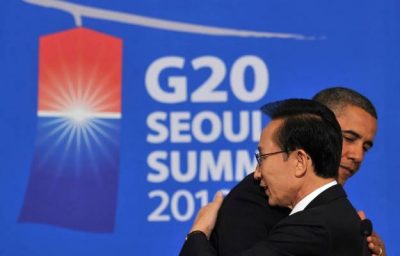Finalising the bilateral agreement between Korea and the US (KORUS) at the end of last week is a positive sign that America is turning away from the abyss of trade protectionism. Important though KORUS might be, it is just a small first step. More importantly, with the Doha WTO Round still waiting to be done, what game-changing strategy can be put in place to rebuild confidence and establish a new direction in the global trading system? That will be the ultimate insurance against retreat from open trade and commerce?
Indonesia’s Tarde Minister, Mari Pangestu, in this week’s lead essay from her recent Snape Lecture, argues that the most important step is to do a deal on Doha. There is a window of political opportunity next year to do that. There is no more important single act of trade policy that needs resolution. The United States is in a position to call in the chips and get a deal done. It is priority number one. Nothing is more important to the health of the global economy, not mainly because of the scale of the deal but also because of its impact on global economic confidence. The G20 and APEC should maintain focus on a renewed effort at completing Doha. It will need a strong political and policy coalition to get there. But it can be done.
But what comes after Doha and how can the WTO be reshaped to deliver the range of trade and commercial reforms that might constitute the new agenda for the international trade regime today?
Dr Pangestu reviews the range of issues that confront those engaged in modern international commerce. These issues extend well beyond the traditional border barriers to trade that were the early focus of the GATT and the WTO. The complication of regional and bilateral trade agreements and getting discipline over them is another issue that needs attention. It is time to look beyond Doha, work to change the global trade policy game with serious collective effort at WTO reform. Developing a clear agenda for system-reform beyond Doha will take time, but commitment to that now would have a positive impact and the G20 and APEC are the platforms from which to get this idea moving.
Dr Pangestu argues that the trading system is much more complex now than it used to be. She reminds us of the past achievements of APEC in support for the multilateral trading system, and the opportunity that APEC in 2011 has, with the US as its host in Honolulu, to play a game-changing role on Doha and the WTO.
‘To its credit, APEC contributed to the conclusion of the [Uruguay] Round and the creation of the WTO in 1995’, Pangestu says. ‘APEC can play a similar role in ensuring the successful conclusion of the WTO, Doha Round of negotiations.’
A key message is that emerging economies are transforming the structure of world trade, with the fastest trade growth and with much larger trade shares because their incomes are growing faster than those in the developed world. This trend has been accelerated through the crisis. The flip side of this is that Asian and other economies which are leading trade growth are in a peculiar position of responsibility to lead on the completion of Doha and on getting the momentum together for changing the modus operandi of the WTO beyond Doha. Asian countries can work with the United States in preparation for Honolulu in moving towards that goal. The issues require talking through before negotiation and APEC an excellent venue for this.
Pangestu says that ‘since the global crisis [the multilateral] system has faced the pressures of protectionism … the discipline and framework of the WTO has enabled prevention of a surge of protectionism.’
Elsewhere in her Snape Lecture, Dr Pangetsu modestly sets out the achievements and difficulties in making trade policy in Indonesia. The achievements are substantial and, despite its many problems, Indonesia is now a good news story among emerging economies and continues to gain economic and political stature in the region and globally. Dr Pangestu herself, with her leadership role among emerging economies in the WTO, is well-placed to give guidance and direction to the policy game-change she advocates in world trade policy, hopefully with help from Australia and our other partners in East Asia.

